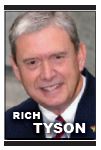Richard Tyson
My career of nearly five decades has largely been focused on gaining an understanding of the characteristics and behaviors of outstanding leaders. I’ve pursued this with the intention to share what I’ve learned with those who occupy leadership roles in order that they might increase their probability of success.{mprestriction ids="1,3"}
While my target market for this has been CEOs and owners of businesses, most of what I have learned readily applies to leadership in virtually any enterprise, including everyone from elected officials to parents leading their families.
Parenting, in fact, provides a strong metaphor for the primary challenge of all leaders. My business partner has wisely noted that the role of parents is not raising children; it is raising adults. In other words, parents must recognize that, from the day their child comes into the world, he or she has begun the process of transformation into adulthood. Parental success is manifested by that child ultimately acquiring the skills and behaviors that will give them a happy and prosperous adult life.
The leadership job of moms and dads, then, is to facilitate that outcome.
For leaders in other settings, the most essential job is similar; it is to create more leaders. Very few enterprises are successful based on the skills and talents of one person alone. Great leaders recognize they need their people to step up and fulfill the responsibilities of their present jobs, while simultaneously growing into the effective leaders needed in the future. Metaphorically, leaders in any setting are not raising children; they are raising adults.
Understanding this desired outcome, it remains critically important that we identify the tools that will increase the likelihood of success in that pursuit. Extensive research has been conducted by universities, think tanks and philosophers for hundreds of years in attempts to define these tools. With that in mind, it would be imprudent for me to suggest that this article will provide the perfect definition. However, I think it’s safe to say that there are two critical dimensions that are present in all successful leaders:
1. Relationship Builder. The Gallup organization stresses that the best relationship-building leaders consistently strive to build trust, demonstrate compassion, provide a sense of stability and energize hope through a compelling vision of a bright future. These leadership behaviors provide the foundation for the interactions required to successfully transform strategic objectives into reality.
Great leaders in virtually any setting need to be highly effective relationship builders. If relationships are stormy, the adversarial atmosphere will significantly depreciate the leader’s chances of executing a successful strategy. In such an environment, it is also unlikely that he or she will succeed in developing their unhappy people into future leaders.
2. Strategy Architect. Perhaps the best definition of successful strategic leaders I’ve found comes from former U.S. Secretary of State Henry Kissinger in his book Leadership: Six Studies in World Strategy. He states that the vital attributes of a highly effective strategic leader are:
A. Courage to choose a direction, a purpose — and a willingness to transcend the routine and inspire others to do hard things, and
B. Character to sustain a course of action, and fidelity to core values over an extended period of time.
With relationships characterized by trust, compassion, stability and hope, leaders have fertile ground for executing their strategies. Courage and character must then be added to assure that great vision is achieved. That vision certainly includes the purpose and mission of the enterprise, but it also should include the successful development of the next generation of leaders.
In today’s world of key performance indicators (KPIs), the metrics of enterprise success are virtually endless. They include a plethora of financial, customer and operating KPIs. While many of these are important, the one metric that often goes untracked is the development of the future leaders who will provide the energy and engagement to lead today’s enterprise into the future.
Today’s leaders — and parents — will soon be gone. Ultimately, their legacy will not be the achievement of political, business or family goals. Rather, it will be embodied in the people who follow them into leadership success — and who, in turn, share what they’ve learned with the generation that follows them.
Richard Tyson is the founder, principal owner and president of CEObuilder, which provides forums for consulting and coaching to executives in small businesses.{/mprestriction}








